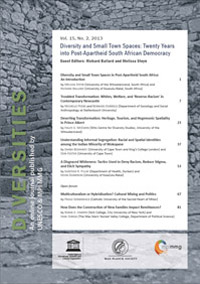OPEN FORUM
How Does the Construction of New Families Impact Remittances?
by Robin A. Harper (York College, City University of New York) and
Hani Zubida (The Max Stern Yezreel Valley College, Department of Political Science)
To cite this article: Harper, R. A., & Zubida, H. (2013). OPEN FORUM ARTICLE: How Does the Construction of New Families Impact Remittances? Diversities, 15(2), 81–95. https://doi.org/10.58002/peq4-rm51
Remittances are a multibillion-dollar industry. Due to the global financial crisis, remittances are an increasingly important issue. Historically, most scholars have considered remittances as an economic phenomenon, exploring the financial impact on individuals, families, communities and the state. These scholars provided insightful models on remittance motivations but assumed that remittance decisions were static. The “social remittances” literature complemented this work and considered remittances beyond their financial utility. Building our analysis from interview and survey data with migrant workers in Israel, we engage this idea of remittances as more than an economic event and explore the meaning of remittances to senders. We contend remittance practices are dynamic, and that people choose to remit or cease remitting at different times for different reasons. We introduce the idea of the ‘new family contract’ to explain why over time people change remittance practices, including ceasing remitting, a concept substantially less discussed in the literature.
Keywords: remittances, Israel, labor migration, family status
|
